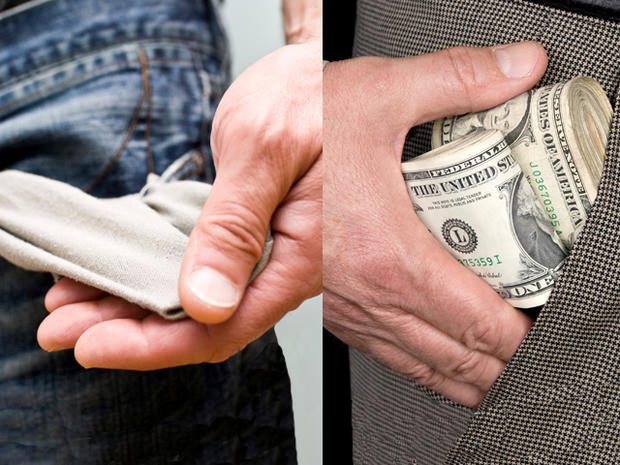Happiness busters: 10 ways you're ruining your mood
(CBS News) Happiness seems more mysterious and harder to obtain than ever before.
New research from Carnegie Mellon University reveals that Americans' stress levels have been on a steady rise for 25 years, and with about one in 10 taking antidepressants, attaining happiness is a difficult task for many.
According to Sean Meshorer, author of "The Bliss Experiment," many of us engage in thoughts and activities that sabotage our mood. The good news, he told CBS News, is once we realize what we're doing to ourselves and learn a few quick and simple remedies, we can change these happiness busters.
Keep clicking to see 10 common mistakes we make that might be ruining your mood - and what to do about them.
The publisher of "The Bliss Experiment," Simon & Schuster's Atria Smart Books, shares the same parent company as CBS News.
Happiness busters: 10 ways you're ruining your mood
Ruminating on the past
In part, this is because we suffer from selective memory bias. A study led by cognitive neuroscientist Dr. Elizabeth Kensinger of Boston College showed that people are much more likely to remember past negative events than positive ones. The more they dwell on those, the more likely they are to overemphasize everything bad that's ever happened - and exaggerate its impact on their lives.
The past can't be changed. Ruminating on it brings strong feelings of helplessness and bitterness, Meshorer says.
Happiness busters: 10 ways you're ruining your mood
Chasing fame or money
A survey of American billionaires - published in Social Indicators Research - found that as a group, they are no happier than the average middle-class American. Of the minority of billionaires who said they were happy, not a single one listed money as the reason. What did make them happy? Having an abundance of warm, loving relationships and finding their life's purpose.
Other research from University of Rochester professors showed that those who make the pursuit of fame a primary life goal are significantly less happy overall than those who have loftier ambitions.
Happiness busters: 10 ways you're ruining your mood
Worrying about the future
Research from psychologist Suzanne Segerstrom of University of Kentucky finds that the more time people spend generating, "What if something bad happens" scenarios, the more likely they'll needlessly dwell on the most anxiety-inducing outcomes that turn out to almost never actually happen - putting them through the emotional ringer for nothing. Not only does this kind of worrying generate anxiety, but research published in Circulation indicates it also leads to coronary heart disease and may shorten lifespan.
Happiness busters: 10 ways you're ruining your mood
Obsessing over physical appearance
A study in the Journal of Positive Psychology, found that even runway models at the peak of their beauty were significantly less happy and had more psychological problems than their average counterparts. One study in the Australian and New Zealand Journal of Psychiatry that looked at children between the ages of 9 and 12 found those who believed beauty was a key to happiness were more likely to develop depression than those who didn't.
Beauty makes people dependent on others' evaluations for their esteem. This creates anxiety because hopes for happiness are transferred into the hands of acquaintances and strangers - people over whom we ultimately have little control.
Happiness busters: 10 ways you're ruining your mood
Engaging in bad habits on auto-pilot
Research published in Scientific American reveals that many of our "happiness failures" are due primarily to bad habits rather than inability or ill-intent.
The good news, Meshorer says, is that once we become aware of habits sabotaging our happiness, research by Phillippa Lally in the European Journal of Social Psychology shows that we can change them in as few as 18 days.
Happiness busters: 10 ways you're ruining your mood
Thinking in black and white
Research published by psychologist Nalini Ambady of Stanford University has shown polarized thinking creates at least two serious problems: First, it virtually guarantees that reality is being distorted, leading to poor decisions and critical errors in judgment. Second, too much distorted thinking magnifies negative emotions including, depression, anxiety, anger and fear.
Happiness busters: 10 ways you're ruining your mood
Being a pessimist
Happiness busters: 10 ways you're ruining your mood
Surrounding yourself in negative environments
Research published in the Journal of Broadcasting and Electronic Media and Psychological Science showed that too much negative media consumption - like watching depressing news or movies, playing violent video games, listening to sad or angry music or reading disturbing books can severely impact mood, emotions and life outlook for the worse.
Happiness busters: 10 ways you're ruining your mood
Hanging with the wrong crowd
In related findings, people who sustain meaningful, healthy relationships are happier than those who do not. Abundant social networks are why people of Bangladesh, one of the poorest countries in the world, report higher levels of happiness than most of us in developed countries.
Happiness busters: 10 ways you're ruining your mood
Being selfish and self-centered
Meshorer's research finds that understanding other people's perspectives, being compassionate and serving others selflessly are essential for happiness. The more we focus only on ourselves, he says, the more likely we are to ruminate, worry and skew our perceptions of reality for the worse.
A study by ethicist Stephen G. Post of Case Western Reserve University shows that people who are considerate of and helpful towards others are happier, more emotionally resilient, have fewer psychological problems and boost their physical health and longevity. They're also more likely to be promoted in the workplace, experience less stress and be less likely to burn out.










